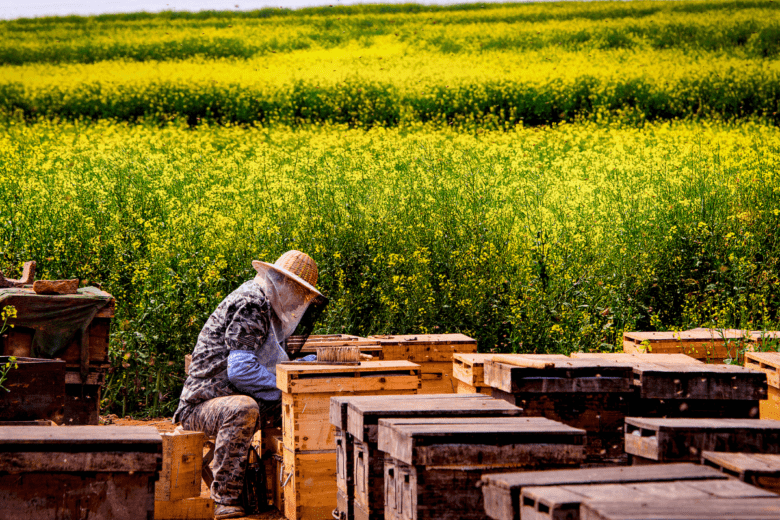Bees play a critical role in the balance of our ecosystems. As primary pollinators, they are essential for the reproduction of many flowering plants, which in turn supports the food chain and biodiversity. Bees contribute to the health of trees, shrubs, and flowers, which provide habitat and food for countless other organisms. Without bees, many plants would struggle to reproduce, leading to a cascade of negative effects on the animals and humans that depend on those plants. The intricate relationships within ecosystems highlight the importance of bees, not only for plant life but also for maintaining the balance and health of entire ecosystems.
Bees are responsible for pollinating approximately 75% of the fruits, nuts, and vegetables grown in the United States. This means that one out of every three bites of food we take is a result of bee pollination. Their work in pollinating crops like almonds, apples, and blueberries is invaluable to agriculture, contributing significantly to food production and security. Beyond food crops, bees also pollinate plants used for biofuels, fibers such as cotton, and other raw materials.
The Growth of Beekeeping and Its Global Impact
In recent years, beekeeping has seen significant growth worldwide, driven by an increasing awareness of the importance of bees and the benefits they bring to agriculture and the environment. This resurgence in beekeeping is not only a hobby for many but also a crucial agricultural practice that supports crop yields and food production. Urban beekeeping has also gained popularity, with city dwellers setting up hives on rooftops and in gardens, contributing to the local ecosystem and promoting biodiversity in urban areas.
The global impact of beekeeping is profound. Beekeeping initiatives have been implemented in various parts of the world to support sustainable agriculture and improve livelihoods. In developing countries, beekeeping can provide a source of income for rural communities, promoting economic stability and food security. Additionally, beekeeping projects often emphasize the importance of environmental stewardship, encouraging practices that protect and enhance natural habitats.
Beekeeping also plays a critical role in addressing the decline in bee populations. By maintaining and increasing the number of healthy bee colonies, beekeepers help counteract the effects of habitat loss, pesticide use, and diseases that have contributed to the decline of bees worldwide. The growth of beekeeping, therefore, represents a vital effort in safeguarding bee populations and ensuring the continued provision of their invaluable ecological services.
Pollination and Its Relevance to Agriculture
Pollination is the process by which pollen is transferred from the male part of a plant to the female part, allowing fertilization and the production of seeds. Bees are among the most efficient pollinators, visiting flowers to collect nectar and pollen, and inadvertently transferring pollen from one flower to another. This process is crucial for the reproduction of many crops and wild plants. In agriculture, effective pollination can significantly increase crop yields and quality. Without bees, many crops would have lower productivity, which would impact food supply and prices.
The Benefits of Pollination for Food Production
Pollination by bees is vital for the production of a wide variety of fruits, nuts, and vegetables. Crops like apples, almonds, blueberries, and cucumbers rely heavily on bee pollination. The enhanced pollination provided by bees leads to better fruit set, size, and quality. This, in turn, ensures a more abundant and nutritious food supply. The economic value of bee pollination is immense, contributing billions of dollars annually to global agriculture. By improving crop yields and quality, bees help farmers increase their income and sustainability.
How Bees Contribute to Biodiversity
Bees support biodiversity by pollinating a wide range of plants, including wildflowers and trees. This pollination is essential for the reproduction of many plant species, which in turn provide habitat and food for other wildlife. The presence of diverse plant species supports a healthy ecosystem, offering various resources for birds, insects, and mammals. Bees play a key role in maintaining this biodiversity, ensuring that ecosystems remain resilient and capable of supporting a wide range of life forms.
Beekeeping as a Tool for Species Conservation
Beekeeping can aid in the conservation of bee species, including those that are endangered. By providing safe habitats and proper management, beekeepers can help sustain bee populations. Conservation efforts often include breeding programs, habitat restoration, and the promotion of bee-friendly practices. These initiatives not only benefit managed honeybees but also support wild bee species. Protecting and conserving bee species is essential for maintaining ecological balance and ensuring the continuation of their vital pollination services.
Positive Environmental Impacts of Beekeeping
Beekeeping has numerous positive environmental impacts. It promotes biodiversity by supporting the health and proliferation of bee populations. Healthy bee populations contribute to the pollination of wild plants, which supports diverse ecosystems. Beekeeping also encourages the preservation of natural habitats, as beekeepers seek to protect areas that provide forage for their bees. Furthermore, beekeeping can enhance awareness and education about environmental issues, fostering a culture of conservation and sustainability.
The Role of Beekeeping in Environmental Sustainability
Beekeeping is a sustainable agricultural practice that supports environmental health. It requires minimal inputs and can be integrated into various farming systems without causing harm. Beekeepers often adopt environmentally friendly practices, such as avoiding pesticides and promoting organic farming. By supporting healthy bee populations, beekeeping helps ensure the sustainability of pollination services, which are critical for food production and ecosystem stability. Sustainable beekeeping practices also contribute to the conservation of natural resources and the mitigation of climate change effects.
How Beekeeping Helps Restore Degraded Areas
Beekeeping can play a significant role in the restoration of degraded areas. Bees can be introduced to areas where vegetation has been lost due to deforestation, agriculture, or other human activities. As bees pollinate plants, they help establish vegetation that stabilizes soil, prevents erosion, and improves soil fertility. This vegetation can create a habitat for other species, promoting ecological recovery. Beekeeping projects in degraded areas often involve planting bee-friendly plants, which supports both the bees and the restoration of the ecosystem.
Reducing Pesticide Use Through Beekeeping
Beekeeping encourages the reduction of pesticide use, which benefits both bees and the environment. Pesticides can harm bee populations, leading to declines in pollination services. By promoting organic farming and integrated pest management practices, beekeepers help minimize pesticide exposure. This creates a safer environment for bees and other beneficial insects. Additionally, reducing pesticide use improves soil health and water quality, contributing to overall environmental sustainability.
Beekeeping as a Sustainable Income Alternative for Farmers
Beekeeping provides a sustainable income alternative for farmers, especially in rural and developing areas. It requires relatively low investment and can be practiced alongside other agricultural activities. The sale of honey, beeswax, propolis, and other bee products can generate significant income. Beekeeping also supports food security by improving crop yields through pollination. By diversifying their income sources, farmers become more resilient to economic and environmental challenges, promoting long-term sustainability.
Success Stories: Beekeeping and Sustainable Agriculture in Action
There are numerous success stories where beekeeping has been integrated with sustainable agriculture to great effect. For example, in Kenya, beekeeping has been used to improve food security and income for smallholder farmers. In Brazil, beekeepers and farmers collaborate to enhance coffee production through effective pollination. These success stories demonstrate how beekeeping can be a powerful tool for promoting sustainable agriculture, improving livelihoods, and protecting the environment. They offer valuable insights and lessons that can be applied in other regions and contexts.
Challenges and Solutions in Integrating Beekeeping with Agriculture
Integrating beekeeping with agriculture presents several challenges, including habitat loss, pesticide use, and climate change. However, there are solutions to these challenges. Creating bee-friendly habitats, adopting organic farming practices, and implementing integrated pest management can help mitigate the negative impacts on bees. Collaboration between farmers and beekeepers is essential for addressing these challenges and finding effective solutions. Education and awareness-raising initiatives can also play a crucial role in promoting the benefits of beekeeping and encouraging sustainable practices.
Technologies and Innovations in Sustainable Beekeeping
Technological advancements and innovations are driving the evolution of sustainable beekeeping. Modern beekeeping tools and equipment, such as hive monitors and GPS tracking, help beekeepers manage their colonies more effectively. Innovations in bee breeding and disease management are improving the health and resilience of bee populations. Additionally, research on bee behavior and ecology is providing new insights that inform sustainable beekeeping practices. These technologies and innovations are essential for ensuring the future of beekeeping and maximizing its benefits for agriculture and the environment.
The Future of Beekeeping and Its Transformative Potential
Beekeeping stands at the intersection of environmental stewardship, agricultural sustainability, and economic resilience. As we look to the future, the role of beekeeping in shaping a sustainable world becomes increasingly evident. The decline in bee populations due to habitat loss, pesticide use, and climate change underscores the urgent need for concerted efforts to protect and promote beekeeping. By fostering healthy bee populations, we not only safeguard the vital pollination services that underpin our food systems but also contribute to the preservation of biodiversity and the stability of ecosystems.
The transformative potential of beekeeping extends beyond environmental benefits. It offers a viable livelihood for many, particularly in rural and developing regions, enhancing food security and economic stability. The integration of beekeeping with sustainable agricultural practices can lead to more resilient and productive farming systems, reducing dependency on harmful chemicals and promoting ecological balance.
Looking ahead, innovations in beekeeping technology and practices will continue to play a crucial role. Advances in hive monitoring, disease management, and breeding can help mitigate the challenges faced by beekeepers, ensuring the health and productivity of bee colonies. Furthermore, increased collaboration between scientists, beekeepers, farmers, and policymakers will be essential in developing and implementing strategies that support sustainable beekeeping and its myriad benefits.
Support and Incentives for Sustainable Beekeeping
To realize the full potential of beekeeping, it is imperative to provide robust support and incentives for sustainable practices. Governments, organizations, and communities can play a pivotal role in this regard. Financial incentives, such as grants and subsidies, can encourage the adoption of sustainable beekeeping practices, making it more accessible and viable for small-scale and new beekeepers.
Educational programs and training workshops are equally important. By equipping beekeepers with the knowledge and skills needed to manage their hives sustainably, these initiatives can enhance the overall success and impact of beekeeping operations. Support networks and cooperatives can also provide beekeepers with resources, market access, and a platform for sharing best practices and innovations.
Moreover, policies that protect and restore natural habitats, regulate pesticide use, and promote organic farming can create an environment conducive to beekeeping. Research funding for studying bee health, behavior, and ecology is crucial for developing science-based solutions to the challenges facing bees and beekeepers.
In conclusion, the future of beekeeping is bright, with the potential to drive significant environmental, agricultural, and economic benefits. By recognizing and harnessing this potential, we can foster a more sustainable and resilient world. Through collective action, innovation, and support, beekeeping can continue to flourish, ensuring that the vital services provided by bees remain a cornerstone of our ecosystems and food systems.

Hi, I’m James Stevan, an avid beekeeper with over a decade of experience in apiculture. My passion for bees drives me to share practical tips and insights on sustainable beekeeping. Join me as we explore the fascinating world of bees and their crucial role in our ecosystem.




